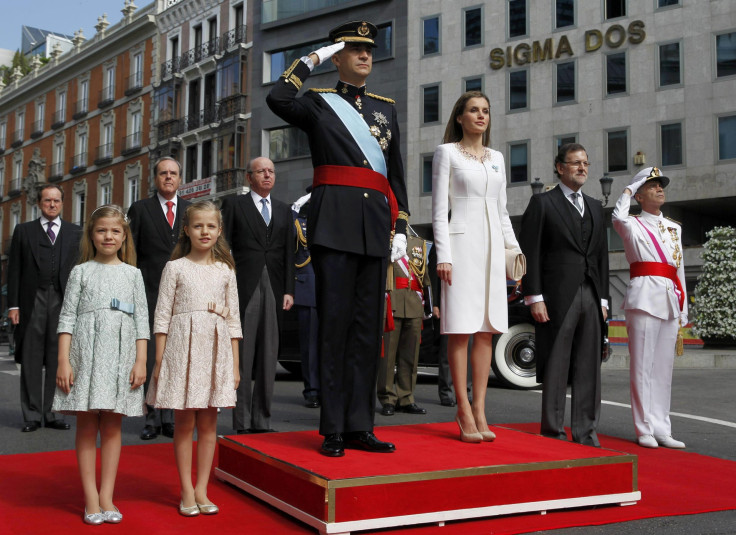
Felipe VI has officially been sworn in as Spain’s new King, following a rather low-key and humble proclamation ceremony, as opposed to other European coronations. Joined by his wife, Letizia, a former journalist and Princess also received a new title Queen of Spain. The proclamation occurred on Thursday, after King Felipe VI’s 76-year-old father, the former King Juan Carlos I of Spain officially abdicated the throne. Following a stint of 5 operations in 18 months, Juan Carlos tearfully announced on June 2, 2014 that he was abdicating in favor of his son, then then Prince Felipe, the papers were officially signed and sealed last night at midnight. According to CNN, Juan Carlos has said his 46-year-old son has "the maturity, the preparation and the sense of responsibility necessary" to serve as King and "to lead to a new stage of hope using his experience and the drive of a new generation."
Despite Juan Carlos 39-year reign, the Spanish crown has experience trouble in recent years, King Felipe, who was sporting his impressive military uniform, spoke to the people and leaders of Spain, declaring to head a changed monarchy "for new times." In a packed parliamentary chamber in Madrid, Felipe stated, "We have a great country, we are a great nation -- let us trust in it.” The proclamation and reception possessed more of a military-style quality, while no foreign leaders were invited, native high-level politicians and lawmakers were in attendance, as well as the other members of the royal family including his father and his mother, former Queen Sofia, and the new King and Queen’s two daughters, Princess Leonor and Princess Sofia.

Felipe thanked his father, and paid tribute to Juan Carlos’ “extraordinary” reign. The new King highlighted his father’s leadership when in 1975 Spain returned to democracy following the death of Dictator Francisco Franco. After also thanking his mother for her years of hard work and devotion to the Spanish people, Felipe shifted his focus to Spain’s future. He spoke of the need for the King, who has been relegated to something of a figure head in the past, is now needed, more than ever, to unify Spain and to work closely with political leaders. While this sentiment may seem ordinary for a proclamation speech, Felipe’s word held extra significance now as Spain’s Catalonia region declare a referendum on independence.
He also vowed to carry out his duties, remain loyal to his nation and work for the interests of Spain. "I will honor the pledge and the oath I have just taken," he said. Spain has recently underwent serious economic woes, with the unemployment rate reaching a high of 25.9%, considering this the low-key proclamation ceremony, may serve as the first of several smart political decision made by King Felipe, who while addressing many issues plaguing both the monarchy and the country, urged Spaniards to have hope. He also spoke of the need for its people, at a time of adversity, to "look ahead to the Spain we are building together as I begin this reign." He then ended his speech by saying “thank you” in three Spanish regional languages - Catalan, Basque and Galician.
© 2025 Latin Times. All rights reserved. Do not reproduce without permission.






